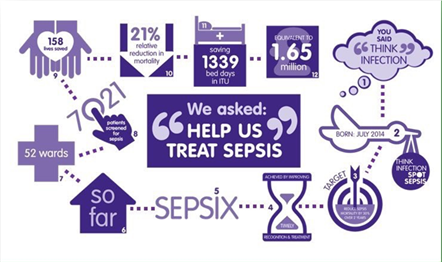'And when his work is done, his aim fulfilled, of the best leaders the people will say : we did it ourselves'
Lao Tzu Sepsis is a condition that can lead to multi‐organ failure, septic shock and, eventually, death.
37,000 people in the UK die of sepsis every year. The literature suggests there are clear evidenced‐based measures that can be introduced to stop sepsis and save lives.
Mortality from severe sepsis and septic shock can be significantly reduced by implementing the sepsis 6 bundle of care which includes the prompt administration of fluids, oxygen and intravenous antibiotics after blood cultures have been taken in conjunction with monitoring of serum lactate and urine output.
This work is a safety imperative. If, at scale, we were able to make basic standards of care routine, with a reliability level of 80% across organisations, we could save 10,000 lives and release potential cost savings for the NHS of at least £170million.
Funded by the Health Foundation as part of their Closing the Gap programme, our Sign up to Patient Safety Programme was launched in July 2014 .
The implementation of the Sepsis6 bundle into a healthcare setting has previously been applied to emergency care wards and critical care units.
This project aimed to apply the bundle across all wards in a single healthcare organisation of acute and community hospitals within the English NHS.
Our intention was to address the lack of awareness of sepsis and the low levels of recognition and early intervention, all of which result in unnecessary illness and death. A launch event for more than 120 multidisciplinary staff,patients and carers was held – we asked for their help in defining our improvement objectives and their commitment to making care better. They told us to keep the message clear and simple – our ‘Think Infection, spot sepsis’ campaign began.
Our initial aims :
• To reduce sepsis mortality by 30% over two years
• To improve the timely recognition of sepsis
• To improve the timely treatment of sepsis
We learnt that formal screening using a newly developed Infection Screening Tool once sepsis is suspected, is the key intervention prompting use of the sepsis six bundle and confers a mortality benefit. Our teams ensured that over 7021 patients were effectively screened for sepsis, red flag sepsis and severe sepsis across 52 wards in 15 months.
Early recognition of sepsis with a bespoke screening tool was in itself enough to afford a 21% mortality (relative) reduction.
Multidisciplinary staff at all levels were trained to act swiftly if sepsis was suspected.
We didn’t stop the clock, but measured every week how we were doing with sepsis6 compliance within an hour.
Ward level information was fed back to teams in a timely way.
Our data suggests that compliance with the sepsis6 bundledelivery affords a 14.7% mortality (relative) reduction.
We moved from a baseline position of 10% of treatment within the hour to 70% in June 2016. Lives were saved within both the sepsis and severe sepsis group – an estimated 158 lives so far.
Early recognition and treatment has also saved 1339 ITU bed days equivalent to£1.65M
Patients and carers have been involved in a variety of ways - in evaluating our care, raising public awareness of sepsis, educating our staff, raising awareness of safety risks on the ward through Think Safe and making a significant to our recent learning event as partners in improvement.
Short films were used on the day to celebrate the contribution and commitment of the many staff who had acted quickly to save lives.
A carer described why it was important to think beyond merely surviving sepsis as she described the long term consequences of the illness and how her family had been forever changed.
We also took time to reflect on the occasions where we’d failed to recognise sepsis.
http://www.youtube.com/watch?v=rQpe4EtgtYA&sns=em
http://www.youtube.com/watch?v=7LUsvLRaj7w&sns=em
With thanks to the Health Foundation for their support of this work and to our fab teams who made it happen.. For further details or info contact Dr Eliot Sykes : [email protected]

